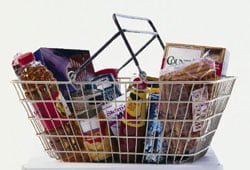The government has a good scam going on rising prices. They’re trying to hold public sector pay down to 2.1%, which is the rate of inflation measured by the Consumer Prices Index. But if you measure inflation by the Retail Prices Index (another official government index) prices have gone up by more than 4% over the past year.
Shoppers
Shoppers (and that’s all of us) have reason to believe both indexes are rigged. The price of staple foodstuffs – eggs, bread, frozen peas, butter and dairy products have gone up by 20-30% over the past twelve months. The website Mysupermarket.co.uk reports that food prices have gone up 12% overall. That’s £750 a year extra on the bills for a family of four. It’s a global trend. There have already been food riots in Mexico, West Bengal, Morocco, Senegal and Yemen.
Why are prices going up faster now? There are four main reasons:
1.) Petrol prices have been going up. Oil, that was little more than $10 a barrel in 1998, has now hit $100. The world economy has been addicted to cheap crude for too long. When the price is low it is used for everything. In farming petrol is burned up to plant the crop, to irrigate it, to harvest it and to carry it to the market.
2.) The second reason is the weather. We can’t blame capitalism for the weather, can we? Of course we can’t blame every hurricane on the system. But we have been authoritatively warned that climate change is going on and is aggravated by human emissions of greenhouse gases. This process used to be called ‘global warming.’ But it has been renamed climate change because it will not lead to a universal warming. It will cause extreme weather conditions all over the world, including hurricanes.
3.) There has been a big increase in the price of the basic staples – wheat, maize and soya. You may think you don’t eat much soya, but if you eat animals, you do. The reasons for the hikes are complex. The grain trade is dominated by a handful of secretive firms like Cargill and Bunge y Born. They have run down stocks by half this year, making supplies susceptible to speculation. Another reason for the shortage is the diversion of potential foodstuffs to the biofuels market (see Rob Walsh’s article in issue 155: Global warming – why biofuels miss their target).
Biofuels
As the Observer points out (20th Jan 2008) this is setting 850 million chronically poor people in the world against 800 million motorists. Guess who’s got more purchasing power? "The maize to fill a tank for a ‘Chelsea tractor’ would feed a family of four for three months." The US government subsidises American farmers to grow maize not to feed the world’s poor but to make biofuels.
4.) The fourth reason sounds more positive. There’s a boom in China and India. The beneficiaries are changing to a diet of more meat. And it takes more grain to feed an animal than it does to make a loaf to feed your appetite. We could plan for this change. But under capitalism, shortages just show up as rising prices.
Are prices going to stop going up? It’s not likely. In another Observer article Richard Wachman declares "Water becomes the new oil as the world runs dry." He quotes a senior executive banker as saying, "Today everyone is talking about global warming, but my prediction is that in two years water will move to the top of the geopolitical agenda."
Climate change is actually part of the problem. The retreat of the Himalayan ice floe, already apparent, will cause the whole Indian subcontinent to go thirsty. That’s a lot of people. Under capitalism, shortages give the rich the opportunity to charge for things that were free when they were more abundant. It looks like that’s what will happen to water if we let them get away with it. According to Credit Suisse by 2025 almost two-thirds of us will be short of water, the most basic requirement of life.
Under capitalism, shortages mean that prices go up. Inflation is a way of attacking working class living standards. We need to fight back. We need to get automatic cost of living increases built into our contracts of employment. The present round of price increases has hit food prices particularly hard. The poor spend more of their income on food. Inflation hits the weakest, those least able to defend themselves, hardest.
Rising prices of essentials are a fact of life under capitalism. It’s time to change the system.






